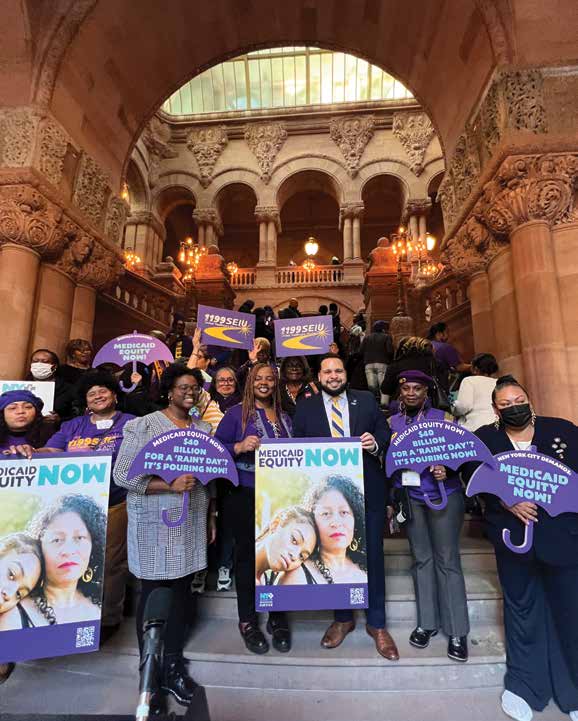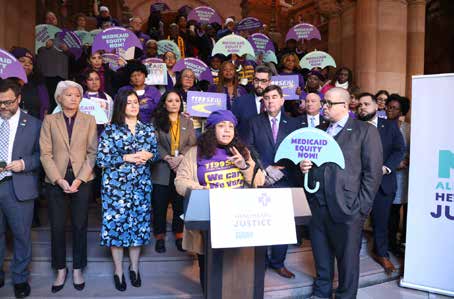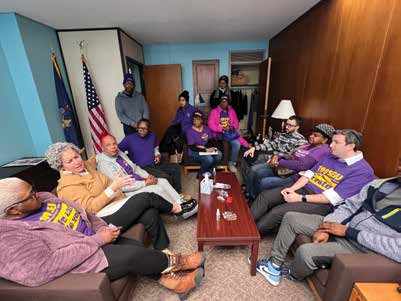Healthcare Justice Now
February 15, 2024
It’s time to demand New York State stop selling Medicaid short.

All the way from Buffalo to the eastern tip of Long Island, members have been confronting their legislators with the stark realities of short-staffing and service line cuts in their institutions, which are getting in the way of delivering the quality care that all New Yorkers deserve.
1199ers know that a small portion of the state’s unprecedented reserves could close the Medicaid funding gap, save struggling hospitals, and protect low-income seniors, children, families and people with disabilities. So, they are demanding that New York Governor Kathy Hochul fund Medicaid to protect the most vulnerable in the state who need help right now.
Shameka Burnette-Mathews traveled all the way from Niagara Falls with fellow members from Erie, Chautauqua and Niagara counties to give her elected representatives a first-hand account of what the Medicaid gap means in practice. Burnette-Matthews, an 1199 Delegate and Medical Secretary at Oishei Children’s Hospital in Buffalo, told them, “Even for those patients who are not on Medicaid, the funding gap affects the services the hospital can offer to everyone, including those with private insurance
“It wouldn’t take away from anything else,” she said. “We know that local representatives in Western New York agree. It is a matter of what they tell the Governor when they are in the big room.”

Medicaid equity is a civil rights issue. Over seven million New Yorkers rely on the services it funds—the majority of whom come from Black and Latino communities. But at the moment, New York State is reimbursing hospitals 30 percent less than the actual cost of needed care. This Medicaid funding gap endangers healthcare providers and the low-income patients who rely on them.
The impact of COVID has only made matters worse, with hospitals across New York State struggling more than ever. Many have already slashed maternity care and mental health services, and dozens teeter on the financial brink. Last year, both Kingsbrook Jewish Medical Center in Brooklyn and Beth Israel Medical Center in Manhattan announced that they were closing services. Eastern Niagara Hospital in Western New York already closed its doors last June. The New York State Office of Mental Health has also reported the closure of 850 inpatient psychiatric beds across the State. Chronic underfunding of psychiatric services makes operating and staffing these services extremely difficult. Over the past 15 years, nearly 30 maternity units have shut down or reduced services.
Sandra Diaz an 1199 Delegate and CNA at the Cabrini nursing home in Dobbs Ferry, has personal experience of what reducing maternity care means.
“With the state paying out 30 percent less than what care actually costs, it means that there are fewer providers willing to accept Medicaid in the Bronx and around the state,” she said. “Women in the Bronx and similar communities are much more likely to have these childbirth complications than women in wealthy areas. I had to have two C-sections myself. It breaks my heart imagining that my babies could have gone home from hospital without their mother. It troubles me that my neighbors— Black & Latina women—are much more likely to have C-sections, life-threatening complications and even fatalities during childbirth.”

“Why? Are my neighbors in Morris Heights 30 percent less valuable than people in other communities?” she said.
NYS elected representative also heard from Ana Medina, an 1199 Delegate and home care worker who lives in the South Bronx.
“I’m the mother of three and have three beautiful grandchildren,” Medina said. “Growing up, my kids depended on Medicaid, and now two of my grandchildren are on Medicaid. Many people may not realize that so many hardworking New Yorkers, including healthcare workers who take care of other people’s families, do not have private insurance. This means our children often depend on Medicaid to be healthy.”
Medina also knows what it’s like to have to go through the re-enrollment process every year—worried that they are looking for any excuse to take away her children’s’ health insurance.
“Kids are exposed to so much at school. It is critical they have coverage,” she adds. “Missing checkups and shots, leaving asthma untreated—there are so many conditions that can become severe when they could have been prevented. Children and their parents should not worry about paying for medical expenses when they are struggling with an illness. We should be doing everything possible to keep children healthy—not putting up roadblocks.”

